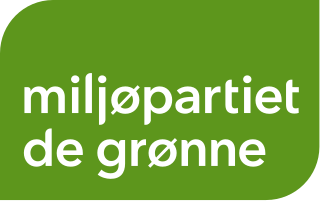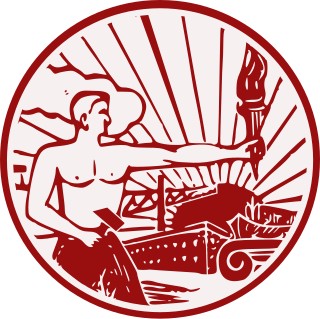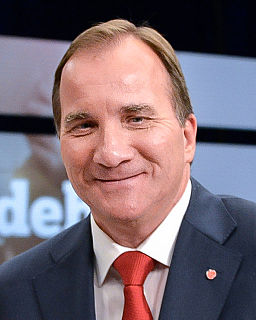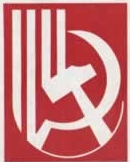Related Research Articles

Syndicalism is a current in the labor movement to establish local, worker-based organizations and advance the demands and rights of workers through strikes. Most active in the early 20th century, syndicalism was predominant amongst revolutionary left in the Interwar era which preceded the outbreak of World War II.
Anarcho-syndicalism is a political philosophy and anarchist school of thought that views revolutionary industrial unionism or syndicalism as a method for workers in capitalist society to gain control of an economy and thus control influence in broader society. The end goal of syndicalism is to abolish the wage system, regarding it as wage slavery. Anarcho-syndicalist theory generally focuses on the labour movement. Reflecting the anarchist philosophy from which it draws its primary inspiration, anarcho-syndicalism is centered on the idea that power corrupts and that any hierarchy that cannot be ethically justified must be dismantled.

Avesta Municipality is one of 290 municipalities of Sweden. It is in Dalarna County, in the central part of the country, and its seat is in the town of Avesta.

Ljusdal Municipality is one of Sweden's 290 municipalities within Gävleborg County. Its seat is Ljusdal.

Dalarna is a landskap in central Sweden. English exonyms for it are Dalecarlia and the Dales.

Hälsingland, sometimes referred to as Helsingia in English, is a historical province or landskap in central Sweden. It borders Gästrikland, Dalarna, Härjedalen, Medelpad and the Gulf of Bothnia. It is part of the land of Norrland.
The Green Party is a political party in Sweden based on green politics.
The International Workers' Association – Asociación Internacional de los Trabajadores (IWA–AIT) is an international federation of anarcho-syndicalist labor unions and initiatives.

The Green Party is a centre-left green political party in Norway. The party holds three seats in the Parliament of Norway and also has representation in municipal councils and county councils. The Green Party advocates green politics, and has been described as centre-left by academics and voters. The party itself claims distance to the two dominant right-wing and left-wing political blocks, jointly denominated as "the fossil block", and have stated their refusal to form a government with any parties that will continue to drill for oil in the North Sea.
Municipal List was a local political party in Älvdalen, Sweden.

The Syndicalist Party was a left-wing political party in Spain, formed by Ángel Pestaña in 1932. Pestaña, a leading member of the Confederación Nacional del Trabajo (CNT) trade union, formed the party in response to the growing influence of the Iberian Anarchist Federation over the CNT. He and other notable members of the CNT had previously signed a Manifest dels Trenta, which had got them expelled.
The Health Care Party is a political party in Sweden with a focus on healthcare issues. It regards itself as cross-political single-issue party.
Old Environmental Party in Järfälla was a political party in Järfälla, Sweden. Its name implies that it predated the formation of the nationwide Miljöpartiet. The party contested the 1982 municipal elections. It got 585 votes, but failed to win any seats. After the elections a dispute surged between the party and Miljöpartiet, as both parties claimed that the votes for the other party should be counted in the favour of their own party. The election authorities turned down the requests, saying that the party names were clearly different.

Anarchism in Sweden first grew out of the nascent social democratic movement during the later 19th century, with a specifically libertarian socialist tendency emerging from a split in the movement. As with the movements in Germany and the Netherlands, Swedish anarchism had a strong syndicalist tendency, which culminated in the establishment of the Central Organisation of the Workers of Sweden (SAC) following an aborted general strike. The modern movement emerged during the late 20th century, growing within a number of countercultural movements before the revival of anarcho-syndicalism during the 1990s.

The First International Syndicalist Congress was a meeting of European and Latin American syndicalist organizations at Holborn Town Hall in London from September 27 to October 2, 1913. Upon a proposal by the Dutch National Labor Secretariat (NAS) and the British Industrial Syndicalist Education League (ISEL), most European syndicalist groups, both trade unions and advocacy groups, agreed to congregate at a meeting in London. The only exception was the biggest syndicalist organization worldwide, the French General Confederation of Labor (CGT). Nevertheless, the congress was held with organizations from twelve countries participating. It was marked by heated debate and constant disagreements over both tactics and principles. Yet, it succeeded in creating the International Syndicalist Information Bureau as a vehicle of exchange and solidarity between the various organizations and the Bulletin international du mouvement syndicaliste as a means of communication. It would be viewed as a success by almost all who participated.
Swedish folk music is a genre of music based largely on folkloric collection work that began in the early 19th century in Sweden. The primary instrument of Swedish folk music is the fiddle. Another common instrument, unique to Swedish traditions, is the nyckelharpa. Most Swedish instrumental folk music is dance music; the signature music and dance form within Swedish folk music is the polska. Vocal and instrumental traditions in Sweden have tended to share tunes historically, though they have been performed separately. Beginning with the folk music revival of the 1970s, vocalists and instrumentalists have also begun to perform together in folk music ensembles.

General elections were held in Sweden on 14 September 2014 to elect all 349 seats in the Riksdag, alongside elections for the 21 county councils, and 290 municipal assemblies.

The Communist Collective of Catalonia was a political organization in Catalonia. It was formed in 1977 as a split from the Communist Organization of Spain. Leaders of CCC included Joan Oms, Antoni Montserrat, Maria Olivares and Consol Casals. CCC published Quaderns de Debat.

General elections will be held in Sweden on 11 September 2022 to elect the 349 members of the Riksdag. They in turn will elect the Prime Minister of Sweden. Under the constitution, regional and municipal elections will also be held on the same day.
References
- 1 2 3 4 Statsvetenskaplig tidskrift för politik, statistik, ekonomi. Statsvetenskaplig tidskrifts expedition. 1957. pp. 152–153.
- ↑ Arndt Johansson (1955). Arbetarrörelsen i Dalarna. Dala-Demokratens Tr. p. 438.
- ↑ Nu kommer Miljöpartiet!: om miljöpartiet. Timo. 1982. p. 76. ISBN 978-9177560050.
- ↑ "Vad vill syndikalisterna?". Archived from the original on 2001-03-07. Retrieved 2004-10-11.